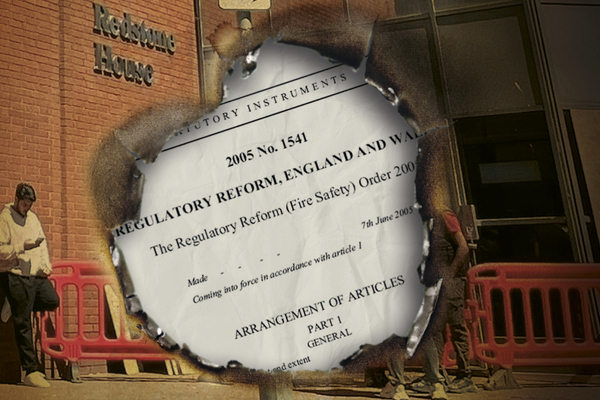You are viewing 1 of your 1 free articles
Evictions have consequences. Landlords should pay for them
‘Relocation relief’ would go a long way towards breaking the cycle between evictions, poverty and homelessness, says Nye Jones, head of campaigns at campaign group Generation Rent
A few years back, I received a Section 21 notice from my landlord giving me two months to uproot my life and find somewhere new to live. I don’t need to tell you that renting in London is extremely expensive and I was already paying the limit of what I could afford.
So, despite having two months to find somewhere new, to avoid paying double rent, I waited until the final few weeks of this period to properly look for a new home. Despite queuing outside countless flat viewings and spending hours on the phone with letting agents, I was unable to find somewhere in time.
Luckily for me, I was able to move back in with my mum until I was able to find somewhere permanent. While returning to my childhood bedroom at nearly 30 wasn’t quite the life trajectory I’d imagined, it was better than the alternative.
Statistics consistently show the end of a private tenancy as the most common cause of homelessness. Meanwhile, a record number of households are trapped in temporary accommodation in the UK, including over 150,000 children in England alone, at great expense to local councils. Often these people are living in overcrowded, run-down homes characterised by damp and mould.
After over a decade of campaigning from renters’ organisations, including Generation Rent, the government’s Renters’ Rights Bill will finally outlaw Section 21 ‘no-fault’ evictions. Landlords will only be able to evict a tenant through no fault of their own if they want to sell or move themselves or a family member into the property, with a one-year ban on reletting the property to discourage misuse.
“Generation Rent’s research shows that the average cost of an unwanted move for an adult two-person household is an eye-watering £2,216”
Alongside this, landlords will have to give tenants four months’ notice.
While longer notice periods are welcome, the huge costs of an unwanted move threaten to water down the impact. In England, Matthew Pennycook, the housing minister, has said that one of the core aims of the Renters’ Rights Bill is to allow renters to “stay in their homes for longer, build lives in their communities and avoid the risk of homelessness”.
But Generation Rent’s research shows that the average cost of an unwanted move for an adult two-person household is an eye-watering £2,216.
Coupled with the fact that around half of private renters have no savings at all, it’s clear many renters will continue to wait until the last moment to find somewhere new to live, like I did, and may end up being pushed into homelessness as a result.
This is where the need for ‘relocation relief’ becomes clear. Put simply, it means that if a landlord evicts someone because they want to sell or move into the property, the tenant will not be required to pay their final two months of rent. This will significantly increase the window in which a tenant can find a new home without risking falling into debt, poverty or homelessness because of upfront moving costs and paying double rent.
Landlords may have fears about letting tenants live rent free, but in reality, it would barely touch their bottom line. In the case of eviction for sale, the profits that a landlord would make out of the sale would more than compensate them. If they’re planning to move themselves or a family member in, they are already anticipating not receiving the same level of rent as before. Additionally, in many cases, it will also mean they get their property back sooner.
“Relocation relief would help renters like me get the breathing space we need to cope financially and emotionally with an unexpected move”
The approach has international precedent, with renters in both California in the United States and British Columbia in Canada entitled to compensation if they’re evicted through no fault of their own.
The Welsh government recently accepted a recommendation by a cross-party committee to explore the policy, before unfortunately rejecting it. But, during scrutiny of the Housing (Scotland) Bill, Shirley-Anne Somerville, the cabinet secretary for social justice, said she was “sympathetic” to relocation relief and that it could be part of the conversation in the Scottish government’s upcoming review of possession grounds.
We are now finally moving away from the idea that landlords can evict people on a whim, but some renters will still be forced to uproot their lives through no fault of their own, at great financial and emotional cost. Longer notice periods will help renters come to terms with this and give us more time to plan for the future, but the high cost of renting will limit its impact.
Relocation relief would help renters like me get the breathing space we need to cope financially and emotionally with an unexpected move, going a long way towards breaking the cycle between evictions, poverty and homelessness.
Nye Jones, head of campaigns, Generation Rent
Sign up for our tenancy management newsletter
Already have an account? Click here to manage your newsletters
Latest stories









